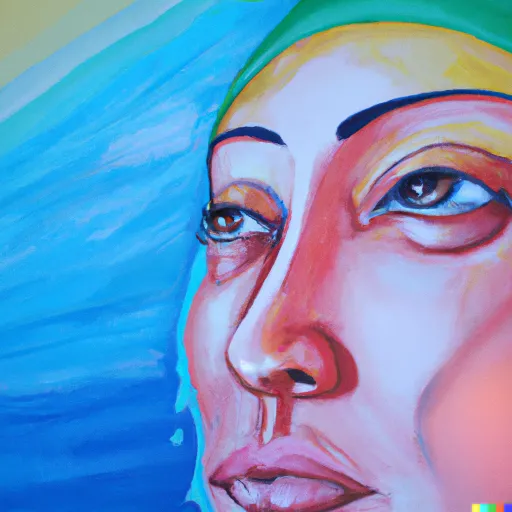Case Study: Anabel

Anabel: Volunteering with "Under the Sun" Project to Empower Saharawi Refugees
Introduction:
Anabel is a 22-year-old psychology student with a visual impairment of 7% visual acuity. She is a volunteer with “Under the Sun“, a project that aims to improve the living conditions of Saharawi refugees. In this case study, we will explore her motivation behind volunteering, the support she received, the project’s objectives, the barriers she faced, and how digital tools could help her in her efforts.
Motivation:
Anabel was motivated to volunteer with the “Under the Sun” project after seeing the unfair living conditions of Saharawi refugees. She felt compelled to help after learning about their struggles and the historical connection between her country and the Saharawi people.
Support Received:
Anabel received support from other organizations, including some companies and NGOs that usually help others in aiding refugees.
Objectives:
The objectives of the “Under the Sun” project include installing air conditioning, water tanks, building houses, and other improvements to enhance the living conditions in the camps. As of now, 23 air conditioners, 9 water tanks, and 8 houses have been installed/built.
Barriers:
Anabel had to overcome barriers to volunteer with the “Under the Sun” project, including the limited resources available, the challenge of working in a different country, and the accessibility barriers that came with her visual impairment.
Lessons Learnt:
Anabel’s story highlights the importance of identifying an issue and taking action to create positive change, even as a volunteer. Her ability to work with limited resources and overcome obstacles is an inspiration for other potential entrepreneurs and social change agents. By embracing digital social entrepreneurship, Anabel could enhance her efforts and make an even greater impact on the lives of Saharawi refugees.
Impact:
The impact of this case study is to inspire and encourage individuals to take action and create positive change, even as volunteers, despite limited resources and obstacles. It highlights the importance of identifying issues and supporting projects that aim to improve the living conditions of marginalised communities. Additionally, the use of digital tools and technology, such as crowdfunding platforms, social media, and mobile apps, can enhance efforts to create social change and make a greater impact on the lives of those in need. Besides, this case study serves as an example of the power of community action and digital social entrepreneurship in creating a better world.
Conclusion:
Anabel’s project, “Under the Sun,” also highlights the role of digital social entrepreneurship in addressing social issues. Digital social entrepreneurship refers to the use of digital technologies and tools to create and implement solutions that address social and environmental problems. In Anabel’s case, digital tools can play a significant role in helping her achieve the project’s objectives and expand its impact [1].
One example of how digital tools can help Anabel is through crowdfunding platforms. Crowdfunding platforms enable individuals and organizations to raise funds from a large number of people, often through the internet. This can help Anabel raise funds for the “Under the Sun” project, enabling her to reach more refugees and make a more significant impact. Furthermore, crowdfunding can also provide a platform for Anabel to share the story of the Saharawi refugees and raise awareness about their plight.
Digital tools can also help Anabel connect with other organizations and individuals working on similar projects. Social media platforms such as Facebook, Instagram, LinkedIn, Twitter, or even TikTok can be used to build a network of supporters and collaborators. By connecting with others, Anabel can share best practices, receive advice and support, and leverage the strengths of different organizations to achieve the project’s objectives more effectively.
Moreover, digital tools can facilitate communication and coordination among project stakeholders. For example, online open-source project management tools such as OpenProject, MyCollab, web2Project, or Taiga can help Anabel manage tasks, deadlines, and project updates efficiently. Additionally, digital tools such as team communication and video conferencing platforms can help Anabel collaborate with stakeholders who are geographically distant.
This case study aligns with several United Nations’ Sustainable Development Goals (SDGs):
- SDG 1: No Poverty – The “Under the Sun” project aims to improve the living conditions of Saharawi refugees, who are living in poverty.
- SDG 3: Good Health and Well-being – By installing air conditioning and water tanks, the project seeks to improve the health and well-being of the refugees.
- SDG 6: Clean Water and Sanitation – The installation of water tanks directly aligns with this goal.
- SDG 11: Sustainable Cities and Communities – The building of houses and other improvements in the refugee camps contribute to the creation of sustainable communities.
- SDG 17: Partnerships for the Goals – Anabel received support from other organizations, including companies and NGOs, which highlights the importance of partnerships in achieving the SDGs.
In conclusion, Anabel’s project demonstrates the potential of digital social entrepreneurship to address social issues. By leveraging digital tools such as crowdfunding, social media, and online project management, Anabel can achieve the project’s objectives more effectively and expand its impact. Anabel’s work is a reminder that social entrepreneurship is not only about creating innovative ideas, but also about leveraging existing tools and technologies to achieve social impact.
References:
[1] Zhang, T. & Chen, Y. (2019). Digital Social Entrepreneurship: A Systematic Literature Review and Future Research Directions. Sustainability, 11(23), 6735. https://doi.org/10.3390/su11236735
